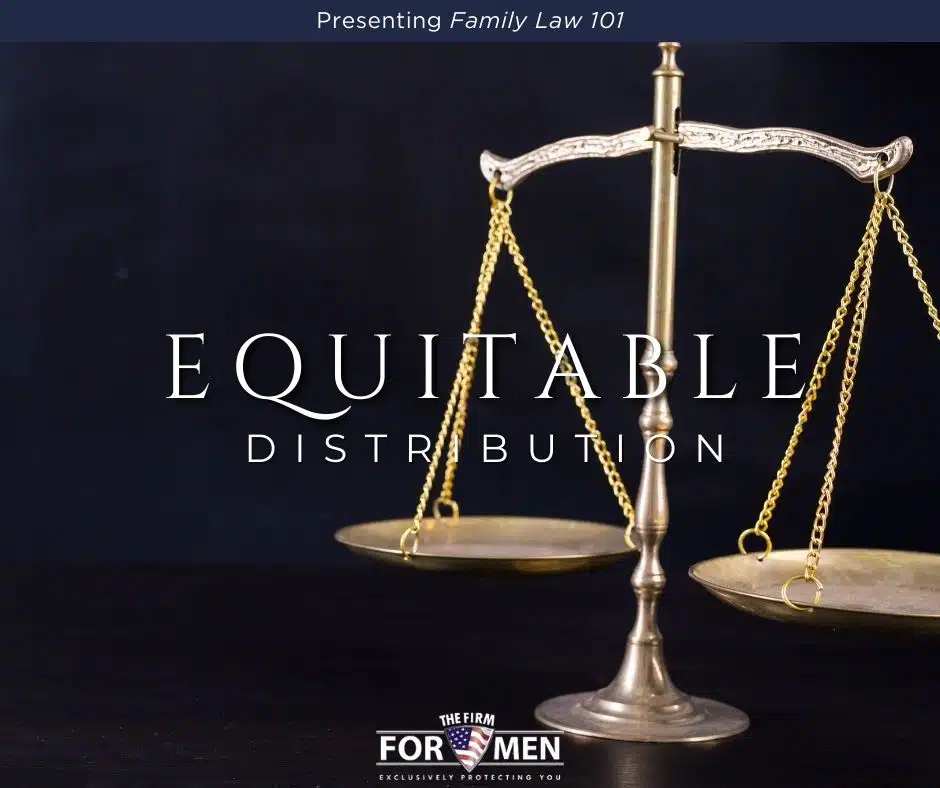This article is a part of our Family Law 101 series.
Jump to a Section
- Equitable Distribution Definition
- Equitable Distribution Laws in Virginia
- Equitable Distribution Definition
- How to Calculate Equitable Distribution
- Marital Waste
- Marital Debt
- Common Equitable Distribution Issues
What Is Equitable Distribution?
Equitable distribution is the fair allocation of a marriage’s assets and liabilities based on a specified list of factors a judge uses in deciding who gets what. Virginia is part of the majority of U.S. states using equitable distribution, rather than community property, in dividing assets and debts of a marriage.
Equitable Distribution Laws in Virginia
Equitable distribution is seen in the Code of Virginia and case law:
- 20-107.3. Court may decree as to property and debts of the parties
- 55.1-200. How married persons may acquire and dispose of property
- Spaid v. Spaid
- David v. David
Of these references, Virginia Code § 20-107.3 shapes the majority of decision-making in Commonwealth Circuit Courts.
What Is Equitable Distribution?
Equitable distribution is a method used by more than 40 states to fairly (not equally) divide marital assets and debts.
As the Virginia State Bar explains, “marriage is considered an economic partnership. To determine a fair division of marital property and debts, Virginia law requires that property and debts be classified as marital, separate, or part marital and part separate.”
Further, as the Bar outlines:
- Marital property and debts must be valued
- Marital property or debts must be equitably divided based on the statutory factors in Virginia Code Section 20-107.3
Marital property is a very broad category of tangible and intangible possessions, all of which have to be included in a fair and just property settlement. Marital property in Virginia is distinguished from separate property and commingled property. Separate property is anything brought to the marriage owned by the single spouses before marriage, such as an inheritance.
How to Calculate Equitable Distribution
Anything bought during the marriage using resources of the marriage (joint bank accounts, credit cards, and the like) is considered marital property and is subject to equitable distribution. This includes:
- Primary and secondary homes
- Investment properties
- All vehicles
- Boats
- Furniture and furnishings
- Artwork
- Jewelry
- Bank accounts
- Pensions
- Securities (stocks, bonds, and mutual funds)
- Retirement accounts
- Intellectual property (patents, copyrights, trademarks, trade secrets, inventions, software coding, domain names and the like)
- Royalties
The test for these various types of property is simple: if they were acquired or created during the marriage using marital resources, they are marital property.
A spouse’s intangible contribution — the emotional, physical, practical, sexual, and social support the spouse provided to the other spouse — is sufficient reason for that spouse to get an equitable share. This support is assumed to have helped with the acquisition of the asset.
Marital Waste
A companion issue to equitable distribution is marital waste. Suppose you and your spouse agree to divorce and begin cataloging all of your assets. If your spouse deliberately destroys, sells, or disposes of an asset for the purpose of depriving you of your equitable share, that is marital waste or dissipation of assets.
The spouse found by the court to be committing marital waste faces painful consequences. The statute providing a judge authority to consider one spouse’s deliberate marital waste is §20-107.3(E)10:
- “The use or expenditure of marital property by either of the parties for a nonmarital separate purpose or the dissipation of such funds, when such was done in anticipation of divorce or separation or after the last separation of the parties.”
While you may be frustrated by your spouse’s willful act of dissipation of your marital assets, your attorney is best positioned to fight this. It is very much a “cutting off your nose to spite your face” problem, since it decreases the value of your spouse’s distribution as well as yours.
Marital Debt
Just as marital assets of all kinds is to be equitably divided, marital debt in all its forms is also allocated fairly:
- Student debt, if the debt was incurred during the marriage with a goal of improving the marriage
- Unsecured (credit card) debt
- Vehicle loan debt
- Medical debt
- Personal loans
- Mortgage debt on primary and secondary homes
Generally speaking, as long as the debt was incurred during the marriage and was taken on to advance the marriage, it becomes each spouse’s responsibility. The debt is divided between the two parties along the same lines as the assets.
Common Equitable Distribution Issues
Many assets in a marriage are unique and indivisible. Treasured and sentimental items can be challenging to divide between the two parties. Other household possessions that can be tough to distribute fairly:
- Pets
- Artwork
- Handmade articles such as furniture, woven items, clothing, and decorations
- Collectibles
Family heirlooms tend to be easy to trace back to one party or the other and usually fall into separate property, reverting to the spouse who brought them into the marriage.
Real estate is often divided based on assessed value. One spouse can buy out the other spouse’s equity so that one of the two spouses can remain in the marital home.
Vacation homes and even timeshare values can either be liquidated or divided in a manner similar to the marital home.
Vehicles can also be hard to divide, since both spouses may want, for example, a luxury family vehicle. Unless both parties and their attorneys can come to an agreement, a judge may order the liquidation of all such assets — family cars, recreational vehicles, ATVs, motorcycles, and boats — and then equitable distribution of the proceeds.
The services of an experienced family law attorney can greatly streamline equitable distribution and minimize any conflict. The Firm For Men is ready to help you solve problems and find solutions. Contact us today or phone us at (757) 383-9184.

